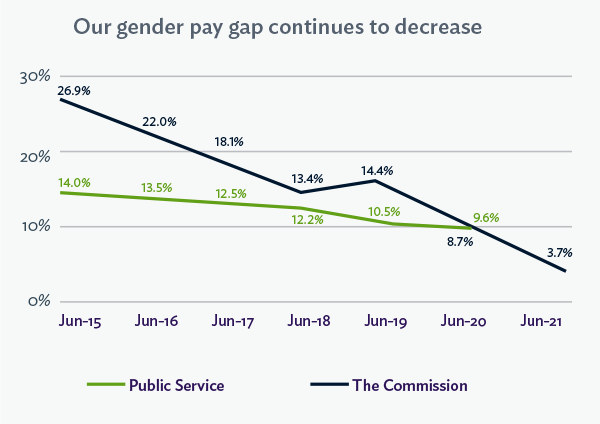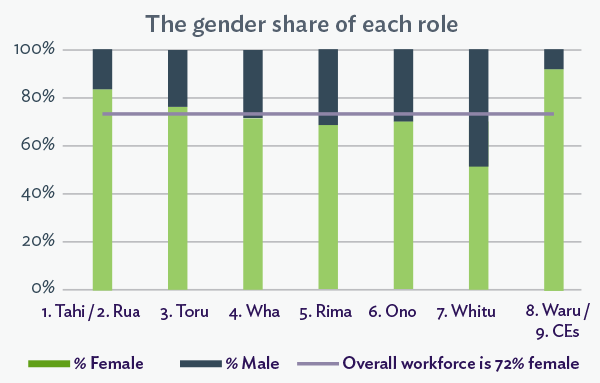We lead the public sector in the service of our nation. We lead, we serve.
The action plan sets out our commitment to leading by example through understanding, addressing and making substantial progress towards eliminating our own agency gender pay gap.
Te Mahere Mahi Rerekētanga Ira Tangata Gender Pay Gap Action Plan 2021–22
Our target
Our target is to be in the top quartile (lowest pay gap) for the Public Service.
Current snapshot (as at 30 June 2021)

- We have made substantial progress in decreasing our gender pay gap in the last year, from 8.7% (June 2020) to 3.75% (June 2021)
- We have exceeded the gender balanced leadership milestone with 70% women in tiers 2 and 3 in Senior Leadership roles as at June 2021
- Although deeper analysis and modelling has been undertaken by workforce segments, due to our small size, to protect anonymity it is inappropriate to publish the detail of this
- The Commission’s small workforce size means that our gender pay gap can be volatile, with senior appointments and business support appointments having the biggest effect on the data.
Gender representation

- Females make up the majority of the Commission’s workforce at 72%. This is an increase of 3% from 2020/21
- The key driver of our gender pay gap is due to representation and the larger concentration of women in business support and advisor roles compared to males, who have a higher representation in more senior roles, such as principals and 3rd tier managers.
Our role level categories are:
1. Tahi/2 Rua - Business support roles and Assistant Advisors
3. Toru - Advisors and equivalent
4. Wha - Senior Advisors and equivalent
5. Rima - Principal Advisors and equivalent
6. Ono - Managers and Chief Advisors
7. Whitu - Assistant Commissioners and equivalent
8. Waru/9 CEs - Deputy Commissioners and CEs on assignment
Employee Voice
We will continue to engage with our people through interactive workshops and staff talk sessions, employee-led networks and PSA delegates.
We will continue to engage staff representatives across the business, to progress aspects of our agency action plan.
Monitoring and reporting
- The People Team will monitor progress and ensure the action plan is meeting its targets in 2021-22. Progress will be reported quarterly to the Commission’s Leadership Team.
- Regular reporting will be provided to LT members for their respective groups via the People Team business partners, focused on gender representation.
Ō mātau aronga matua | Our focus areas, Ngā Tutukitanga| Achievements 2020/21 and Ngā Mahi hei Mahi | Actions
| Ō mātau aronga matua Our focus areas |
1. Flexible work by default We will be an exemplar in flexible work and embed it as part of our ways of working at the Commission. Why? Flexible options, equally available to men and women, and which don't undermine career progression or pay, support different patterns of workforce participation. |
| Ngā Tutukitanga Achievements 2020/21 |
To progress this in 2020/21 we:
|
| Ngā Mahi hei Mahi Actions 2021/22 |
To embed this in 2021/22 we will:
|
| Ō mātau aronga matua Our focus areas |
2. Our people practices We will ensure our people practices are free from the effects of bias at the Commission Why? Addressing bias and discrimination at all stages in the employment cycle will make working at the Commission fairer for everyone. |
| Ngā Tutukitanga Achievements 2020/21 |
To progress this in 2020/21 we:
|
| Ngā Mahi hei Mahi Actions 2021/22 |
To embed this in 2021/22 we will:
|
| Ō mātau aronga matua Our focus areas |
3. Gender representation and career progression We will focus on gender balance at all levels in the Commission and ensure clear and transparent career progression opportunities. Why? The Commission’s gender pay gap is largely due to how men and women are represented in role level categories. Addressing this, and making pathways for progression transparent, will help reduce gender imbalances. However, this will take time. |
| Ngā Tutukitanga Achievements 2020/21 |
To progress this in 2020/21 we:
|
| Ngā Mahi hei Mahi Actions 2021/22 |
To embed this in 2021/22 we will:
|